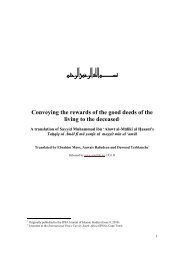al_etidaal_gn
al_etidaal_gn
al_etidaal_gn
You also want an ePaper? Increase the reach of your titles
YUMPU automatically turns print PDFs into web optimized ePapers that Google loves.
had been created as a result of friendship with the kaafirs. This will not be dispelled by<br />
spiritu<strong>al</strong> attention. It will only be removed by the fire of hell.” (Maktoob vol. par V)<br />
What a frightening lesson! It shows that some impurities cannot even be removed<br />
through the focus of spiritu<strong>al</strong> attention of the saints of Allah!<br />
In a “weak” Hadeeth it is said: “Acquire nearness to Allah through hatred for sinners.<br />
Meet them roughly and seek the pleasure of Allah by being displeased with them and<br />
attain nearness to Allah by remaining <strong>al</strong>oof from them.” (Jami — us — Sagheer)<br />
This Hadeeth is supposedly weak as far as its chain of narrators is concerned. But the<br />
contents are corroborated by other Hadeeth. Azeezi wrote that it means that one should<br />
hate the sin and not the person of the sinner. This is <strong>al</strong>so the meaning of <strong>al</strong>l those Hadeeth<br />
wherein the contents are similar to this one. One should hate and resent the sin so that<br />
because of the love we have for someone or our speci<strong>al</strong> relationship with him; one does<br />
not look upon his evil deed as being something light and minor. On the other hand the sin<br />
that is committed by him should not make us disregard the qu<strong>al</strong>ity of Islam which lies in<br />
him. In this way there is a medium way between the two extremes (hatred for him and<br />
unqu<strong>al</strong>ified love). This <strong>al</strong>one is the way in which we can keep <strong>al</strong>l that we have been<br />
commanded to do, in its proper place.<br />
In truth the teachings of Islam were such that it brought about a picture, true to the<br />
description of the Quran:<br />
“And you will see them entering the fold of Allah’s religion in groups.” (CX v 2)<br />
But we have turned our faces away from it. And apart from not only acting upon them,<br />
we are not even enthusiastic enough to learn those teachings. It is the punishment for<br />
these shortcomings which we are suffering nowadays.<br />
Our example is like that of an ostrich. When it is asked to fly, it says that it is a camel.<br />
How can a camel be asked to fly? And when it is asked to carry loads, it says that it is a<br />
bird. How can a bird be expected to carry loads?<br />
So are we. When we are c<strong>al</strong>led upon to carry out the orders of religion and act upon it, we<br />
say: “We are people living in this 14th Century. We are weak and ineffective. How can it<br />
be expected of us to emulate the .deeds of the noble Sahabah (Radi<strong>al</strong>lahu anhum)? They<br />
were strong and sturdy people. They were people of the good early days of Islam who<br />
were fortunate to have sat at the feet of Rasulullah (S<strong>al</strong>l<strong>al</strong>lahu Alayhi Was<strong>al</strong>lam) and<br />
enjoyed his blessed company. How can we ever come near to them in action?”<br />
But when mention is made of their grand accomplishments, their conquests of lands and<br />
kingdoms, their progress and advances on <strong>al</strong>l fronts, and when mention is made of the<br />
respect honour and high rank they enjoyed, we exclaim: “We too are Muslims, followers<br />
of Rasulullah (S<strong>al</strong>l<strong>al</strong>lahu Alayhi Was<strong>al</strong>lam), successors to the Sahabah (Radi<strong>al</strong>lahu<br />
Al- Eti’da<strong>al</strong> Fi Maraatibur- Rija<strong>al</strong> 189




